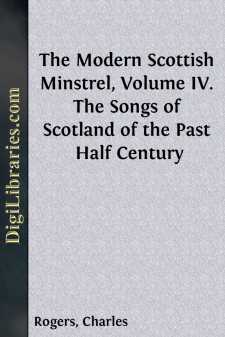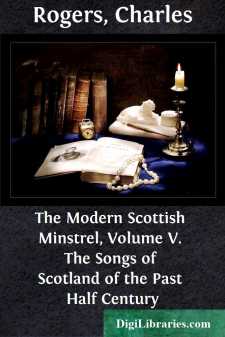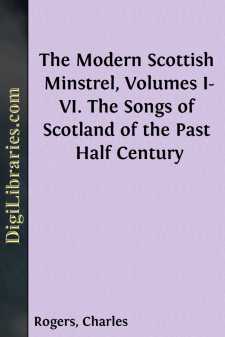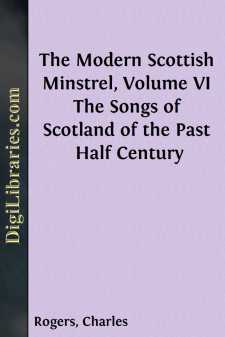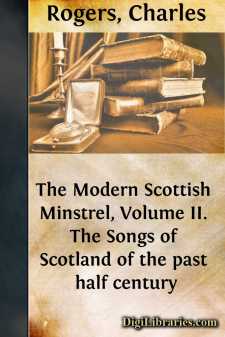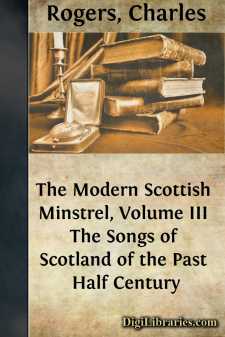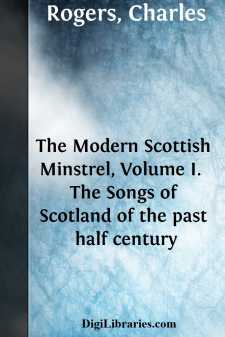Categories
- Antiques & Collectibles 13
- Architecture 36
- Art 48
- Bibles 22
- Biography & Autobiography 813
- Body, Mind & Spirit 142
- Business & Economics 28
- Children's Books 17
- Children's Fiction 14
- Computers 4
- Cooking 94
- Crafts & Hobbies 4
- Drama 346
- Education 46
- Family & Relationships 57
- Fiction 11829
- Games 19
- Gardening 17
- Health & Fitness 34
- History 1377
- House & Home 1
- Humor 147
- Juvenile Fiction 1873
- Juvenile Nonfiction 202
- Language Arts & Disciplines 88
- Law 16
- Literary Collections 686
- Literary Criticism 179
- Mathematics 13
- Medical 41
- Music 40
- Nature 179
- Non-Classifiable 1768
- Performing Arts 7
- Periodicals 1453
- Philosophy 64
- Photography 2
- Poetry 896
- Political Science 203
- Psychology 42
- Reference 154
- Religion 513
- Science 126
- Self-Help 84
- Social Science 81
- Sports & Recreation 34
- Study Aids 3
- Technology & Engineering 59
- Transportation 23
- Travel 463
- True Crime 29
The Modern Scottish Minstrel, Volume IV. The Songs of Scotland of the Past Half Century
by: Charles Rogers
Categories:
Description:
Excerpt
It is exceedingly difficult to settle the exact place of, as well as to compute the varied influences wielded by, a great original genius. Every such mind borrows so much from his age and from the past, as well as communicates so much from his own native stores, that it is difficult to determine whether he be more the creature or the creator of his period. But, ere determining the influence exerted by Burns on Scottish song and poetry, it is necessary first to inquire what he owed to his predecessors in the art, as well as to the general Scottish atmosphere of thought, feeling, scenery and manners.
First of all, Burns felt, in common with his forbears in the genealogy of Scottish song, the inspiring influences breathing from our mountain-land, and from the peculiar habits and customs of a "people dwelling alone, and not reckoned among the nations." He was not born in a district peculiarly distinguished for romantic beauty—we mean, in comparison with some other regions of Scotland. The whole course of the Ayr, as Currie remarks, is beautiful; and beautiful exceedingly the Brig of Doon, especially as it now shines through the magic of the Master's poetry. But it yields to many other parts of Scotland, some of which Burns indeed afterwards saw, although his matured genius was not much profited by the sight. Ayrshire—even with the peaks of Arran bounding the view seaward—cannot vie with the scenery around Edinburgh; with Stirling—its links and blue mountains; with "Gowrie's Carse, beloved of Ceres, and Clydesdale to Pomona dear;" with Straths Tay and Earn, with their two fine rivers flowing from finer lakes, through corn-fields, woods, and rocks, to melt into each other's arms in music, near the fair city of Perth; with the wilder and stormier courses of the Spey, the Findhorn, and the Dee; with the romantic and song-consecrated precincts of the Border; with the "bonnie hills o' Gallowa" and Dumfriesshire; or with that transcendent mountain region stretching up along Lochs Linnhe, Etive, and Leven—between the wild, torn ridges of Morven and Appin—uniting Ben Cruachan to Ben Nevis, and including in its sweep the lonely and magnificent Glencoe—a region unparalleled in wide Britain for its quantity and variety of desolate grandeur, where every shape is bold, every shape blasted, but all blasted at such different angles as to produce endless diversity, and yet where the whole seems twisted into a certain terrible harmony; not to speak of the glorious isles
"Placed far amid the melancholy main,"Iona, which, being interpreted, means the "Island of the Waves," the rocky cradle of Scotland's Christianity; Staffa with grass growing above the unspeakable grandeur which lurks in the cathedral-cave below, and cows peacefully feeding over the tumultuous surge which forms the organ of the eternal service; and Skye, with its Loch Coriskin, piercing like a bright arrow the black breast of the shaggy hills of Cuchullin. Burns had around him only the features of ordinary Scottish scenery, but from these he drank in no common draught of inspiration; and how admirably has he reproduced such simple objects as the "burn stealing under the lang yellow broom," and the "milk-white thorn that scents the evening gale," the "burnie wimplin' in its glen," and the
"Rough bur-thistle spreadin' wideAmang the bearded bear."
These objects constituted the poetry of his own fields; they were linked with his own joys, loves, memories, and sorrows, and these he felt impelled to enshrine in song. It may, indeed, be doubted if his cast of mind would have led him to sympathise with bold and savage scenery....


